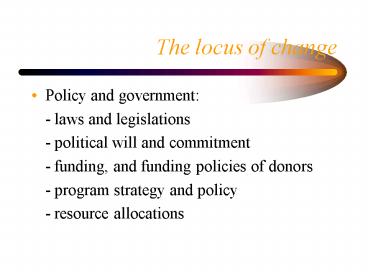The locus of change - PowerPoint PPT Presentation
1 / 11
Title:
The locus of change
Description:
Culture: - norms and attitudes of society - strengths in cultures - oral media and performance ... rules and other social constructs - economic dependence of ... – PowerPoint PPT presentation
Number of Views:43
Avg rating:3.0/5.0
Title: The locus of change
1
The locus of change
- Policy and government
- - laws and legislations
- - political will and commitment
- - funding, and funding policies of donors
- - program strategy and policy
- - resource allocations
2
The locus of change
- Socio-economic status
- - education and training
- - unemployment
- - income generation and remunerations
- - poverty, malnutrition
- - inheritance, marriage, divorce
3
The locus of change
- Culture
- - norms and attitudes of society
- - strengths in cultures
- - oral media and performance
- - tradition and values
4
The locus of change
- Gender relations
- - social habits expectations
- - rules and other social constructs
- - economic dependence of women
- - role of men in society
5
The locus of change
- Spirituality
- - religion and faith
- - churches, mosques, prayer sites
- - belief
- - death, life and fatality
- - influence of faith healers, religious leaders
6
Recommendations
- Address the full HIV/AIDS continuum of
prevention, care, and support. - Integrate a cross-disciplinary approach, drawing
upon knowledge of epidemiology, anthropology,
sociology, information science, psychology, and
community development.
7
Recommendations
- Promote provision, access, and use of various
services and products. - Plan and implement a sustained, coherent, and for
long-term. - Address regional, country, and community
specificity.
8
Recommendations
- Research, monitoring and evaluation are
essential for HIV/AIDS communication programming
to be effective. - Increase advocacy for, and the visibility of,
communication initiatives and their contributions
among UNAIDS co-sponsors, donors and others.
9
Communications Framework the locus for
changeThe UNAIDS Communication Framework A
Call to Focus on the Forest, Not the Tree.Most
past and present strategic planning for HIV/AIDS
communication programming usually begins with
ascertaining the problematic knowledge,
attitudinal, and practice factors among
individuals in the target audience.
10
The new UNAIDS communications framework
urges HIV/AIDS program implementers to reorient
their approach to instead ascertain the role of
socio-cultural influences (socio-economic status,
gender relations, cultural norms, and
spirituality) and environmental influences
(government policy, access to services,
occupational risks) in shaping individual
behavior.
11
The UNAIDS framework calls for refocusing
communication interventions on the basis of five
key contextual domains (1) government policy,
(2) socio-economic status, (3) culture, (4)
gender relations, and (5) spirituality. These
contextual domains, while they lie outside the
skin of individuals, have a significant
influence on their HIV/AIDS-related health
behaviors.Thank you. Muchas gracias.

